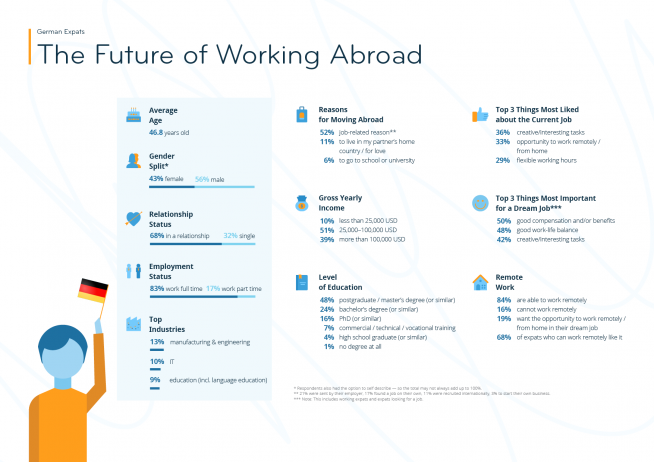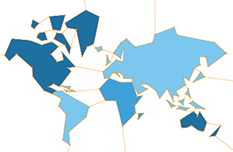Remote Work Is Nice but Not Important for German Expats
Why do Germans move abroad? According to the Expat Insider 2021 survey by InterNations, 52% of Germans working abroad name their career as the most important reason for relocating to another country. Foreign assignments are far more common among Germans than among the global average: 21% of German expats were sent abroad by their employer, compared to 13% globally. Moreover, 17% found a job on their own, 11% were recruited internationally, and 3% moved abroad to start their own business.
German Expats Work Long Hours and Make Good Money
The majority of German expats works full time (83%), and they spend a bit more time at work than the average expat: the average working hours among all working respondents from Germany amount to 41.4 hours per week, compared to 39.9 hours per week globally. This might explain why just 65% are satisfied with their working hours, which is somewhat below the global average (70%). However, around two-thirds (67%) say they are happy with their work-life balance, about the same as the global average of 68%.
However, the long hours seem to pay off: Close to two in five Germans working abroad (39%) make 100,000 USD or more per year, compared to just 23% of expats worldwide. The share of German expats with an income of more than 250,000 USD annually (7%) is even more than twice the global average (3%). On the other hand, just around a quarter (26%) earn 50,000 USD or less, compared to 44% globally.
What German Expats Like about Their Current Job
Considering these numbers, it might be a surprise that a good compensation and/or good benefits is just the fourth-most-cited aspect that German expats like about their current job. Close to three in ten (29%) say they particularly appreciate this factor. What they enjoy just as much or even more is having creative/interesting tasks (36%), the opportunity to work remotely / from home (33%), and flexible working hours (29%).
These factors are all closely related to the concept of New Work. Interestingly, just about half the Germans working abroad (53%) say that New Work is an important part of the business culture in their host country. And only two in five (40%) think that the concept of New Work is more important in their host country than in Germany’s business culture — globally, 49% have moved to a country where New Work plays a more important role than in their respective home country.
German Expats Live the Concept of New Work Abroad
This might be related to the most common destinations where German expats work: the USA, Switzerland, and China. While the USA is voted first worldwide as far as the importance of New Work in the local business culture is concerned, Switzerland lands in a mediocre 23rd place out of 55 countries in this regard. China, however, even ranks among the worst destinations when it comes to the importance of New Work (46th). Germany ranks 35th.
“Although German expats do not only move to countries where New Work plays an important role, they still seem to land in jobs that enable them to live and work according to these values,” says Malte Zeeck, InterNations Founder and Co-CEO. “Seeing that they enjoy having creative tasks, the opportunity to work remotely, and flexible working hours, it seems like German expats find fulfillment in their jobs abroad. And taking the above-average incomes into consideration, their careers abroad seem to offer German expats everything they could wish for.”
Working Remotely Is a Nice-to-Have, Not a Must-Have for Their Dream Job
With remote work being one of the factors German expats like most about their current job, 84% are able to work remotely / from home (vs. 78% globally). The COVID-19 pandemic has had an impact for more than half the German expats in this regard: 32% are now able to work remotely more often than before, and 21% say that remote work was newly introduced by their employer and is now here to stay.
Still, the share of those working remotely for more than 15 days per month (16%) or even fully remotely (37%) is just a little lower than the global average (18% and 39%, respectively). “Germans working abroad seem to enjoy a mix of working remotely and going to the office as many spend less than half the month in a remote setting,” says Malte Zeeck. In fact, around one-quarter (24%) work remotely for 6 to 15 days a month, which is considerably more than the global average (18% globally).
Working remotely is also not among the most important aspects that German expats mention when asked about their dream job. In fact, a good compensation and/or benefits (50%), a good work-life balance (48%), and creative/interesting tasks (42%) are more important to German expats as far as their ideal work environment is concerned. These factors are followed by flexible working hours (27%), while just 19% cite the opportunity to work remotely / from home.
Germans Working Abroad Are Older and More Likely to Have a PhD
Germans living and working abroad are on average 46.8 years old, which is considerably older than the average working expat (43.1 years). German men (56%) tend to work abroad slightly more often than women from Germany (43%). Overall, German expats working abroad are highly educated: close to half (48%) hold a postgraduate degree / master’s degree, and 16% even have a PhD, which is twice the global average (8%).
Despite their education level, the share of German expats working in a senior/specialist position (27% vs. 30% globally) and who are top managers / executives (15% vs. 13% globally) is not that different from the respective global average. Another 21% work in lower/middle management (vs. 17% globally), while just 3% hold an entry-level job (vs. 7% globally). Moreover, close to a quarter are either self-employed / freelancers (12%) or have their own business (11%), compared to a global average of 11% and 7%, respectively.
The top 3 fields German expats work in are manufacturing & engineering (13%), IT (10%), and education (9%). Other frequently mentioned fields of work include coaching & consulting, healthcare, and finance (6% each).




